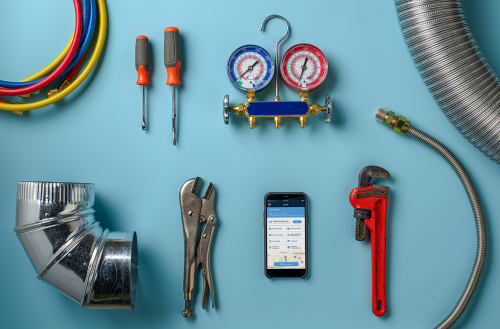How to Select the Right A/c System for Your Requirements
Choosing the proper HVAC system is an important choice that requires cautious factor to consider of various aspects. The myriad of system kinds offered can complicate this procedure, leading one to question which course ultimately leads to optimum convenience and performance.
Evaluate Your Home Size
Evaluating your home size is an essential very first step in selecting the suitable cooling and heating system. The dimension of your home directly affects the home heating and cooling capacity required for reliable climate control. A heating and cooling system that is as well small will certainly struggle to maintain comfy temperature levels, resulting in increased energy intake and wear on the system. On the other hand, a large system can result in short biking, insufficient humidity control, and inefficient operation.
To properly examine your home dimension, measure the square video footage of each area, taking into consideration aspects such as ceiling elevation and the layout. Furthermore, consider the insulation quality and the variety of windows, as these aspects impact thermal efficiency. Homes with open layout may need different system configurations compared to those with lots of separated areas.
Utilizing the Handbook J tons calculation method can give a more precise quote of your heating and cooling needs. This method represent numerous aspects, including local environment, solar gain, and tenancy patterns. By meticulously reviewing these aspects, you can make sure that your selected heating and cooling system is appropriately sized, resulting in enhanced convenience, power efficiency, and longevity of the devices.
Determine Your Budget
Identifying your spending plan is a critical action in the heating and cooling system choice procedure, as it establishes the parameters for your choices - DMAKS HVAC. A heating and cooling system is a considerable financial investment, and understanding your monetary restrictions will certainly aid tighten down selections that fit within your methods
Begin by assessing not only the preliminary purchase price yet likewise installment prices, which can vary substantially depending upon the intricacy of the project. In addition, consider recurring costs such as maintenance, repair work, and power usage. A system may appear affordable at first yet can lead to higher expenses in time if it is much less effective.
It is suggested to allot a contingency fund for unexpected expenses that may develop during setup or first system modifications (DMAKS HVAC). In addition, explore financing alternatives or rebates that may be readily available, as these can alleviate the burden of upfront costs
Eventually, having a clear budget enables you to engage with HVAC professionals better, guaranteeing you receive customized suggestions that aligns with your monetary goals and home demands. By being thorough about your budget, you can make educated choices that boost convenience without endangering financial security.
Evaluate Power Effectiveness
Power effectiveness plays a vital duty in the total efficiency and cost-effectiveness of your HVAC system. Look for systems with a high Seasonal Power Efficiency Ratio (SEER) for cooling down and a high Annual Fuel Application Efficiency (AFUE) ranking for heating.
In addition, consider the Power Star accreditation, which signifies that the system fulfills rigid efficiency guidelines set by the Epa. Buying a Power Star-rated heating and cooling system can bring about considerable helpful resources financial savings over time, especially in locations with extreme temperature variations.
Another factor to evaluate is the system's size and capability. An oversized or small unit can lead to inefficiency and increased energy expenses. DMAKS HVAC. Proper sizing, typically figured out via a Manual J load computation, makes certain that the system runs at optimum efficiency


Think About Environment and Setting
When selecting a HVAC system, it is vital check out here to consider the regional environment and environmental problems, as these factors substantially influence the system's efficiency and efficiency. Various regions experience varying temperature extremes, humidity degrees, and seasonal changes, every one of which influence heating and cooling down demands.

Moreover, regional environmental variables, such as air high quality and potential irritants, must educate your option. Solutions equipped with sophisticated filtering innovations can help reduce pollutants and supply cleaner air. Furthermore, take into consideration the energy sources offered in your area-- some cooling and heating systems are more efficient when powered by natural gas or sustainable energy resources.
Eventually, aligning your heating and cooling system selection with your regional environment and environmental considerations will certainly cause improved convenience, enhanced effectiveness, and lower energy prices.
Explore System Types and Functions
As house owners seek to optimize comfort and performance, checking out the different sorts of heating and cooling systems and their one-of-a-kind functions becomes vital. The main sorts of HVAC systems consist of main air conditioning, warmth pumps, ductless mini-split systems, and heating systems. Each system offers distinctive benefits customized to different needs and preferences.
Central air conditioning systems supply uniform cooling throughout a home, making them perfect for bigger rooms. Warm pumps work as both heating and cooling remedies, making use of power to move warm, which can cause lower power costs. Ductless mini-split systems are becoming significantly prominent as a result of their adaptability and simplicity of setup, enabling house owners to control the temperature level in specific spaces site web without extensive ductwork.

Final Thought
Finally, picking the proper HVAC system requires careful consideration of different aspects, consisting of home dimension, budget restraints, power performance, neighborhood climate, and offered system kinds. A detailed assessment of these components ensures optimum convenience and cost-effectiveness. By complying with a structured technique, house owners can make informed choices that straighten with their particular needs and choices, inevitably bring about improved indoor air quality and power financial savings.